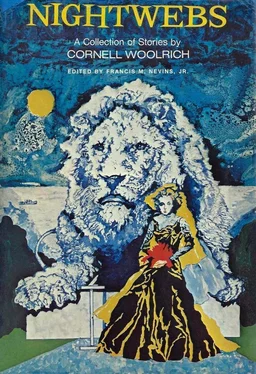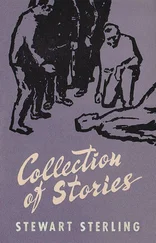They played three numbers through, without a break.
Then the music stopped as though a switch had been thrown, and the stillness was deafening.
“Take five,” Jones said to his musicians.
He came down the way Freshman had, vaulting over the edge, and sat down at the table with him.
He was panting a little, Freshman noticed, although he’d been standing still in one place; so all that shaking must have been work, too.
He was a band leader to the bitter end.
“How’d it sound?” he asked Freshman.
“Screwy,” the latter said. “It hits the ceiling first, and then comes straight down from there.”
“That’s because you’re under the edge of the stand.”
“And that’s where I’m staying,” Freshman let him know.
Jones’ eyes kept roving questioningly over the three sides of the room behind Freshman, going from table to table, lingering a moment, then going on again.
“What’re you looking for, a raiding party to rescue you?” Freshman asked.
“No, that ain’t it.” Jones smiled bleakly. “I got this.” He took the message that had come with the lapel-flower out of his pocket and showed it to him. “We’re going to be shipmates for the next ten days so you may as well know about it.”
Freshman read it, didn’t say anything.
“She keeps teasing me. I know she’s been here every night. I know she’s in the room right now, somewhere over there, looking straight at me. The hell of it is, which one is she? If she doesn’t tip me off tonight, she’s going to be one night too late.”
His men were starting to straggle out onto the stand again. He stood up unhurriedly.
“Well, happy half-notes,” he said. “Be with you.”
He was lithe and agile. He got up the way he’d come down; with the help of one hand and a catlike swing of the legs.
The musical thunderstorm broke again. The flattened-out dancing shadows wheeled slowly across the surface of Freshman’s table. He sat and watched the rippling of Jones’ back muscles under the cloth of his coat.
They seemed to play sets of three each time, and then rest. He came back again. He took a cigarette out of an expensive gold case and thumbed an expensive gold lighter to it. Then as an after-thought, he offered one to Freshman.
He began talking about it, suddenly. The other thing.
“I didn’t do it, you know,” he blurted out. He looked down at the table, as though he could see the whole thing reflected on there.
“I’d say that, too,” Freshman said tonelessly.
“You’d say that, too. Only, they’d give you a chance to prove it. They won’t do the same for me.”
Freshman didn’t dispute that, somehow. “I want you to know about it,” Jones insisted.
“I don’t have to know,” Freshman parried. “I’m not a priest. I’m wearing a tie.”
Jones brought his fist down on the table.
“I have to tell somebody about it! It’s been shut up in me too long. And this is my night for spilling it.”
Freshman sighed with a sort of wearied patience.
“Go ahead,” he said, “I’m listening.”
“I was the driver for the Carneys; the old man, the sheriff, and his son-in-law, Greg Dwyer. I guess you know that. I was the family chauffeur. They had a Packard job, old as Methuselah, but it still ran. Then they had a little Ford coupe. She used to drive that, Miss Amy. Young Mrs. Dwyer. It was her own. A present from her father. I still see it all in my nightmares. Peagreen.
“She’d go out in it in the afternoons, alone. Just for a drive, maybe. It must have been just for a drive. Always out in the country, not toward the village, like for shopping or anything. She’d come back in a couple of hours. About the time I’d go in and pick up the two menfolk.”
His musicians were coming back onto the stand.
He turned his head abruptly, called: “Buzz, lead the next three for me will you? Twenty, Six, and Nine. I’m telling my life-story to this man.”
“Wait’ll Eight-oh-two hears about this,” somebody said and grinned cheerfully.
Jones went ahead telling it to Freshman.
“First she’d just go once a week. Then afterwards, two or three times. Then pretty nearly every day. She’d always take a book with her. I guess she’d stop and read it in the car. Or maybe get out and sit in the shade of a tree. She was a slow reader, though. The jacket on the book was always the same color.
“There was an old backwoods woman did the washing for them. Took it home and brought it back. I met her once at the gate, coming in. She told me she’d spotted the pea-green coupe standing still off the road, in a grove of trees, miles out. She told me there wasn’t anybody in it.
“She asked me what I supposed Miss Amy went all the way out there alone like that for. She told me she thought she spotted another car, a tan roadster, also empty, on the opposite side of the road. But this was a considerable distance below, not anywhere near the first car. And she sort of looked at me — you know how these old women do.
“I told her she ought to learn minding her own business. I told her she better keep that big mouth of hers closed.
“Maybe she did. Maybe it was somebody else’s mouth. Maybe nobody’s mouth at all. Sometimes things are just in the air, and they’re catching from one person to another, like head colds.
“I thought Greg Dwyer acted kind of strange, pretty soon after that. His face was kind of white and set, like there was something troubling him. Something private, between himself and his conscience.
“Then the very next time she’d gone off on one of her lonesome rides, all of a sudden there he was back at the gate, in the middle of the afternoon, without any warning. I wasn’t supposed to pick him and the sheriff up until evening.
“He didn’t ask for her; he didn’t ask any questions. He didn’t even come into the house. I think I was the only one who saw him. The others were all round in back. He just stayed there by the gate. He beckoned, and I dropped the garden hose and went over to him. He said he felt like taking a little drive and told me to get the car out.
“I brought it around and he got in. Next to me, in front.
“‘Not that way,’ he said when I started off. ‘Out into the country.’
“I backed and turned, and headed the other way. We went for miles. Way, way out. Farther out, I think, than I’d ever been before. Suddenly he said, ‘Stop here!’”
Maxi Jones paused and drew a folded handkerchief out of his pocket and carefully mopped his brow.
“I didn’t see anything to stop for,” he went on. “Nothing at all. On one side there was a wooded patch. And on the other a big open meadow, sloping downward from the road.
“He got out and he said, ‘Wait for me,’ and he went off. In among the trees.
“I watched him. That’s when I first saw it. By looking after him, where he was going. A little fleck of pea-green visible through the trees. The car must have turned off the road further back, where there was an opening, and skirted the far side of the trees to where it was now, and then stopped.
“It couldn’t have driven straight through from the place where we were parked. There wasn’t enough space between the trees. You couldn’t have seen it from the road in a thousand years, unless you were looking for it.
“He took about ten minutes. Then he came back, stood beside the car and rested his hand on the door-top and he didn’t say anything. It wasn’t up to me to say anything, so I just waited for him.
“Finally he said, ‘I nearly stepped on a rattlesnake in there just now. Ed, you got that gun with you?’
“They’d given me a gun. It went with the job. A hitch-hiker had robbed and murdered somebody on one of the roads about a year before, and it dated from then. As Sheriff, Carney had turned one of his over to me at that time, to keep with me in the car, and arranged it so that I was licensed to do so. It was mine, and yet it wasn’t. It was on loan to me, you might say, but only so long as I was their driver. It wasn’t my physical property. I was just the custodian.
Читать дальше












